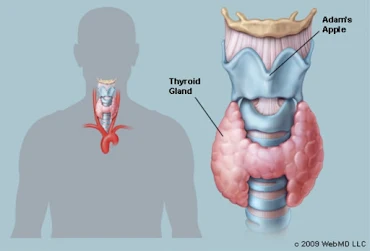
|
THYROID
|
The thyroid is a butterfly-shaped organ that sits in the middle of your neck. In men, it’s situated under the Adam’s apple.
The thyroid releases hormones into your bloodstream; it has control over your energy levels and helps regulate metabolism, develop the brain, control muscles, fertility and more.
However, when your thyroid undergoes difficulties, this is a cause for concern.
Thyroid dysfunction may lead to constipation, weight gain, unbearable fatigue, weakness, and problems with your memory. The most common thyroid issues are either your thyroid is under functioning (hypothyroidism) or over functioning (hyperthyroidism).
What is Hypothyroidism?
As we mentioned, hypothyroidism is when your thyroid is under functioning (or not creating the amount of hormones it should be producing). The thyroid generates the hormones T3 (triiodothyronine) and T4 (thyroxine). These hormones help regulate cell metabolism; when there’s a low supply of T3 and T4, your metabolic function becomes compromised.
Hypothyroidism symptoms may include:
- Fatigue
- Memory problems
- Mood swings
- Depression
- Weight gain
- Muscle cramps
- Cholesterol elevation
- Changes in your blood pressure and/or menstrual cycle
- Blurry vision
- Swollen legs
- Your voice becomes hoarse
- Hair loss
- Constipation
- Hair becomes course; dry skin
- Reduced perspiration
The most common cause of hypothyroidism is Hashimoto’s thyroiditis, an autoimmune disorder in which the immune system works against the thyroid. Within this disorder, antibodies are created by the immune system, which impair the thyroid.
What is Hyperthyroidism?
Hyperthyroidism is when the thyroid overproduces T4, resulting in an accelerated metabolism. As a result, hyperthyroidism can cause inadvertent weight loss and an irregular heartbeat.
Some symptoms of hypothyroidism are:
- Swollen neck
- Low levels of concentration
- Diarrhea
- Breathing and sleeping problems
- Sweating too much
- Increase in appetite and bowel movements
- Infertility
- Mood swings
- Low libido
- Trembling/shakiness
- Menstrual changes
- Weak muscles
- Hair Loss
- Heart palpitations
- Frequently urinating
- Red palms
- Fast weight loss
The autoimmune disorder Graves’ disease is a common cause of hyperthyroidism. Graves’ disease forces the immune system to set target on the thyroid, causing the thyroid to become overactive.
Diagnosing Thyroid Issues
To identify thyroid disorders, a health care practitioner will conduct blood work and/or a thyroid ultrasound. A complete thyroid panel assessment may include these tests: TSH, Free T4, Free T3, Reverse T3, thyroid peroxidase and anti-thyroid antibodies.
TSH: this test measures TSH, a hormone from the pituitary gland; a high level means your thyroid is underactive; a low level means your thyroid is overactive.
Free T4 and Free T3: these tests measure the active form of T3 and T4 and results are usually assessed jointly with other thyroid test results. High totals of Free T4 and Free T3 may specify an overactive thyroid gland; low totals of Free T4 and Free T3 may identify an underactive thyroid.
Thyroid peroxidase and thyroid antibodies: Measuring the levels of thyroid antibodies may help health care practitioners detect an autoimmune thyroid disorder. When the results are negative, this mean the body does not contain thyroid antibodies; however, this shows that symptoms may be caused by something that’s not autoimmune. The higher the number of antibodies in the test, the higher the likelihood that an autoimmune thyroid disorder is present.
RELATED: Top 4 Foods for Thyroid Health
Reverse T3: this test measures for Reverse T3 (or RT3), a T4 metabolite. It is postulated that when the human body undergoes severe illnesses, stress or starvation, the body produces RT3 as a way to preserve energy. Increased RT3 levels is a marker for the reduced uptake of T4 into the cell; it’s also a marker for low T4 and T3 levels that would not usually be seen in serum T4 and T3 tests and TSH tests.










